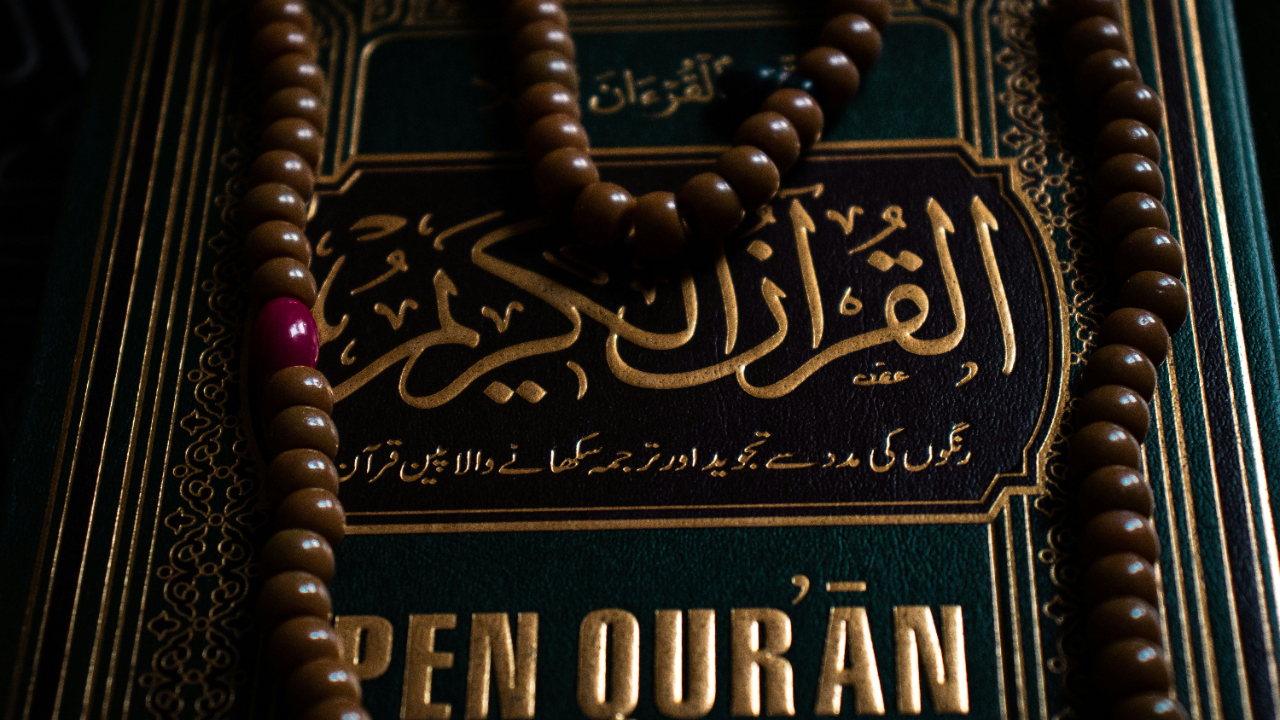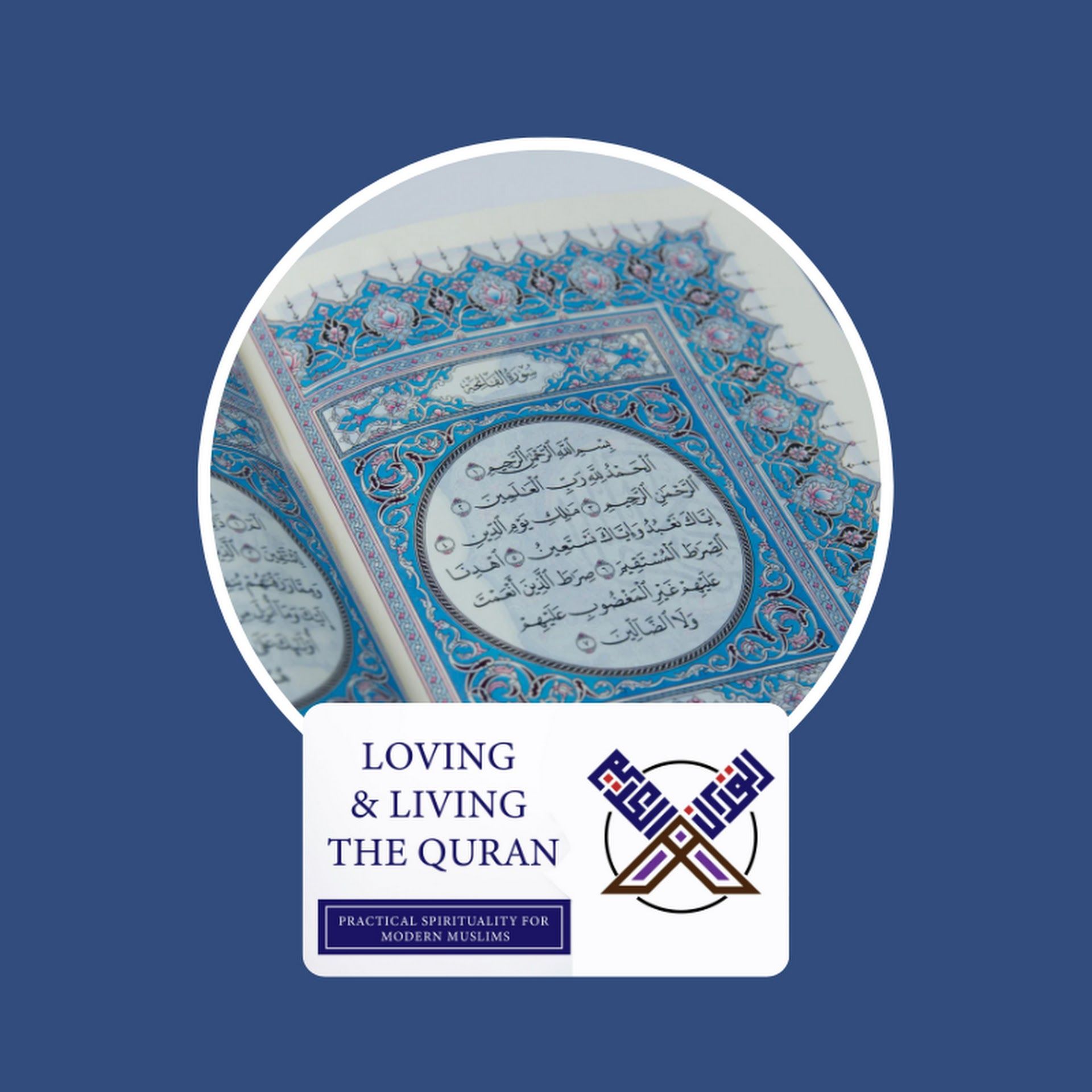Rest your heart in His Remembrance [13:28]
Human beings are always searching for peace and happiness. We may try to find it in material success, in relationships, in personal achievements, in curated experiences or in self-care. We spend a lot of time in our days moving away from pain and moving towards pleasure or satisfaction [do reflect on this – at any given moment in the day, your actions are motivated by one of these two things – moving away from pain or moving towards satisfaction].
The truth is that we are living in an imperfect world and with imperfect fellow humans [!] and there is always plenty to disrupt our search for inner peace and satisfaction.
The Quran points to a simple and profound way that we can find what we are seeking:
الَّذِينَ آمَنُواْ وَتَطْمَئِنُّ قُلُوبُهُم بِذِكْرِ اللّهِ أَلاَ بِذِكْرِ اللّهِ تَطْمَئِنُّ الْقُلُو
[13:28] Those who believe and whose hearts are set at rest by the remembrance of Allah; now surely by Allah's remembrance are the hearts set at rest.
The itminan of the qalb t...
Recognize your true nature [Quran 30:30]

To understand what brings us well-being, peace, and happiness, we must first understand human nature as created by Allah. Only then can we grasp what we need to cultivate well-being.
In Sura Rum, Chapter 30, verse 30 of the Holy Quran, Allah says:
فَأَقِمْ وَجْهَكَ لِلدِّينِ حَنِيفًا فِطْرَةَ اللَّهِ الَّتِي فَطَرَ النَّاسَ عَلَيْهَا لَا تَبْدِيلَ لِخَلْقِ اللَّهِ ذَلِكَ الدِّينُ الْقَيِّمُ وَلَكِنَّ أَكْثَرَ النَّاسِ لَا يَعْلَمُونَ
(Surah Ar-Rum 30:30)
"So direct your face toward the religion, being devout and inclining to truth (hanif), the natural disposition (fitrah) upon which Allah has created all people. There is no altering the creation of God; that is the upright religion, but most people do not know."
Two key words in this verse require deeper reflection:
- Hanif– Refers to one who turns away from misguidance and inclines toward the belief in the Oneness of God (tawḥīd).
- Fitrah– The innate nature upon which human beings are created. This is the divine "operating system" ...
Introduction to Daily Wisdom from the Quran 2025

Ramadan Kareem to you and your families.
Welcome to another season of Daily Wisdom from the Quran. This year's theme is "The Quranic Guide to Mental, Emotional and Spiritual Wellbeing" which we will explore from a verse a day from the Quran.
Before we dive into the topic, it might be useful to define what we mean by wellbeing.
In modern psychology and secular frameworks, wellbeing is often described as a "state of positive mental and emotional health", where individuals feel satisfied, function effectively, and experience a sense of fulfillment.
The Islamic perspective, on the other hand, extends the definition beyond mental and emotional health to include "spiritual alignment, moral integrity, and connection with Allah".
The Secular Definition of Wellbeing:
In secular psychology, wellbeing is typically understood through two major lenses:
1. Hedonic Wellbeing which is the pursuit of pleasure and avoidance of pain, focusing on life satisfaction and positive emotions.
2. Eudaimonic Wellbeing wh...
As We Say Goodbye . . .

As we wrap up the blessed month of Ramadan, we may be feeling a mix of emotions: a tinge of sadness at the ending of the month of Blessings, Mercy and Forgiveness, a sense of relief that we were able to fast and pray [and that we can eat again!] and maybe some regret that we did not or could not do more during the blessed minutes and hours of this sacred month of Allah [swt] when we were His guests.
Many of us have been deeply impacted by the news from Palestine and our sense of helplessness to stop the atrocities. Please let us remind ourselves that we have the huge weapon of Dua at our disposal. And though the month of Ramadan may be coming to an end and our eyes may not water quite so much at every Sahoor and Iftar, thinking of our brothers and sisters starving while we are blessed with an abundance of food and drink at our tables, we cannot and must not forget that we have an ongoing duty to do what little we can which includes turning to Him in prayer to ease their plight and to ...
You have what it takes [2:286]

Yesterday we reflected on a truth about this life from the Quran: that life is full of challenges.
Today, let us look at a promise of Allah [swt] that gives us confidence that we have what it takes to succeed in these challenges and find our way through these distresses.
At the end of Chapter 2, Sura Al-Baqara the Quran tells us:
Allah does not task any soul [impose a duty on, place a burden on] beyond its capacity. [2:286]
This brief selection from a longer verse suggests many important points of reflection:
The word Quran uses for soul is “Nafs”, the struggling part of ourself. The part that struggles to be better and yearns to actualize.
In order not to burden us beyond our capacity or capability, He knows what that capacity is. So many times when we are facing challenges, they seem insurmountable, and we feel completely overwhelmed and inadequate to deal with them. At times like these, it is important to remind ourselves of this verse. Even if we are unsure of our own potential...
A truth about life [90:4]

Today’s reflection is from Sura Balad where Allah [swt] says: Certainly We have created man to be in distress. [90:4]
In this verse, Allah [swt] uses the word kabad for distress. Scholars explain that the word kabad which originally means intensity, also signifies 'a disease in the liver of a person’ and is used for any trouble and misery.
This verse spells out a truth about the human experience during this plane of existence: from the time the human embryo is conceived it will go through difficult stages with pain and toil until the time it is born, and from then on; during his childhood, the period of his adolescence, and through his mature and senior years, he is and will be faced with many kinds of challenges, stresses and distresses.
The problem, though is that even though Allah [swt] has explained this to us in the Quran, we human beings expect something different. We LOVE comfort and luxury and are deeply attached to the idea of a life of stability and ease. We feel entitled ...
Harkat mein barkat [53:39]

In Verse 39 of Sura Najm, Allah says: And that man shall have nothing but what he strives for. (Holy Quran 53:39)
For today’s verse, I could not find a better title than the Urdu phrase: Harkat mein barkat, meaning there is blessing in movement/striving. One of the principles of life, taught by experience and by Divinity, is that human beings get what they strive towards.
It is important to note that what the Quran is telling us is that our outcome will be in accordance with our striving. The Arabic word sa’ā which is used literally means to walk fast, to run almost, to walk with effort. It is used to denote hard work and effort as this means moving ahead fast on the path. It is interesting to note that it does not say that man will have nothing but in accordance to his actions, rather in accordance to the efforts behind his actions. What this means is that it the intention and effort behind the action that counts.
This is quite different to our experience in the material world. Her...
Do what good you can, as soon as you can [23:61]

Today’s reflection is from Chapter 23, Sura Muminum where the Holy Quran says:
"It is they who hasten to every good work and these who are foremost in them." [23:61]
In this verse and a couple of verses preceding it, Allah [swt] points out a few qualities of the believers. One of their qualities that they “hasten to do good deeds”. This desire is borne out of a desire to please Allah [swt] and drives them to take quick action towards worthy causes and goals.
The word the Quran uses is yusāri‘ūna which signifies “racing” towards good actions. It is interesting that while hurry or haste is not considered a virtue, when the haste is in racing towards goodness and virtuous action, it becomes an act of virtue.
Why is haste recommended in doing good works? Imam Bāqir (as) explains: “When you think of doing something good, rush to do it immediately for verily you do not know what could happen later [to prevent you from doing it]” (The Scale of Wisdom, H. 4002).
In other words, as we have...
Attend to what is better on Friday [62:9]

Today’s reflection is verse 9 from Chapter 62, Sura Juma, when Allah [swt] addresses the believers and says:
O you who believe! when the call is made for prayer on Friday, then hasten to the remembrance of Allah and leave off trading; that is better for you, if you know. [62:9]
4 important points are made in this verse:
- When the call for the Friday congregational prayers is made, rush to attend to it. In other words, answer the call and join the congregation as soon as possible.
- Leave trading and other worldly distractions at this time
Trading and business are particularly mentioned as the time for Juma prayers in right in the middle of the work day and these are also the main distractions for those in the marketplace. Of course, it applies to other distractions as well which stop us from joining the congregation on time. - This is better for you
- If only you knew
Allah is reminding us that human beings are short sighted and are often unaware of the bigger picture or what lies ...
Have trust in Allah [3: 159]

Continuing with this verse from Sura Ale Imran:
So by mercy from Allah, [O Muhammad], you were lenient with them. And if you had been rude [in speech] and harsh in heart, they would have disbanded from about you. So pardon them and ask forgiveness for them and consult them in [some of] the matter. And when you have decided, then rely upon Allah. Indeed, Allah loves those who rely [upon Him]. (Quran 3:159)
The final part of the verse advises the Holy Prophet [saw] that once you have decided on a matter, have tawwakul or trust in Allah and ends by saying that Allah loves those who rely upon Him.
Scholars explain that “when you are resolved” or “when you have decided” means that once the step of consultation or decision on his own has been taken, then he should then make his attitude one of trust in God, not in human deliberations
In the Quran, tawakkul is used for a state when man exclusively places his hope and trust upon Allah (swt).
Scholars explain that a person who has tawakkul t...




